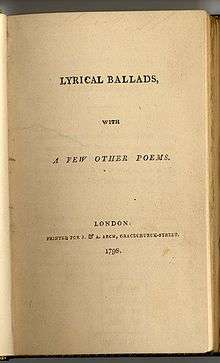Lyrical Ballads

Lyrical Ballads, with a Few Other Poems is a collection of poems by William Wordsworth and Samuel Taylor Coleridge, first published in 1798 and generally considered to have marked the beginning of the English Romantic movement in literature.[1] The immediate effect on critics was modest, but it became and remains a landmark, changing the course of English literature and poetry.
Most of the poems in the 1798 edition were written by Wordsworth, with Coleridge contributing only four poems to the collection, including one of his most famous works, "The Rime of the Ancient Mariner".
A second edition was published in 1800, in which Wordsworth included additional poems and a preface detailing the pair's avowed poetical principles.[2] For another edition, published in 1802, Wordsworth added an appendix titled Poetic Diction in which he expanded the ideas set forth in the preface.[3]
Content
Wordsworth and Coleridge set out to overturn what they considered the priggish, learned and highly sculpted forms of 18th century English poetry and bring poetry within the reach of the average person by writing the verses using normal, everyday language. They place an emphasis on the vitality of the living voice that the poor use to express their reality. Using this language also helps assert the universality of human emotions. Even the title of the collection recalls rustic forms of art – the word "lyrical" links the poems with the ancient rustic bards and lends an air of spontaneity, while "ballads" are an oral mode of storytelling used by the common people.
In the 'Advertisement' included in the 1798 edition, Wordsworth explained his poetical concept:
The majority of the following poems are to be considered as experiments. They were written chiefly with a view to ascertain how far the language of conversation in the middle and lower classes of society is adapted to the purpose of poetic pleasure.[4]
If the experiment with vernacular language was not enough of a departure from the norm, the focus on simple, uneducated country people as the subject of poetry was a signal shift to modern literature. One of the main themes of "Lyrical Ballads" is the return to the original state of nature, in which people led a purer and more innocent existence. Wordsworth subscribed to Rousseau's belief that humanity was essentially good but was corrupted by the influence of society. This may be linked with the sentiments spreading through Europe just prior to the French Revolution.
Poems in the 1800 edition
Poems marked (Coleridge) were written by Coleridge; all other poems were written by Wordsworth.
Volume I
|
Volume II
|
For the 1800 edition, Wordsworth added several poems which make up Volume II. The poem The Convict (Wordsworth) was in the 1798 edition but Wordsworth omitted it from the 1800 edition, replacing it with Coleridge's 'Love'. Lewti or the Circassian Love-chaunt (Coleridge) exists in some 1798 editions in place of The Convict. The poems "Lines written when sailing in a Boat at evening" and "Lines written near Richmond, upon the Thames" are one poem in the 1798 edition entitled "Lines written near Richmond, upon the Thames, at Evening."
References
- ↑ See Lyrical Ballads (1 ed.). London: J. & A. Arch. 1798. Retrieved 13 November 2014. via archive.org
- ↑ Wordsworth, William (1800). Lyrical Ballads with Other Poems. I (2 ed.). London: Printed for T.N. Longman and O. Rees. Retrieved 13 November 2014.; Wordsworth, William (1800). Lyrical Ballads with Other Poems. II (2 ed.). London: Printed for T.N. Longman and O. Rees. Retrieved 15 November 2014. via archive.org
- ↑ Wordsworth, William (1802). Lyrical Ballads with Pastoral and other Poems. I (3 ed.). London: Printed for T.N. Longman and O. Rees. Retrieved 15 November 2014. via archive.org
- ↑ "Lyrical Ballads". The Wordsworth Trust. 2005. Retrieved 18 March 2006.
External links
| Wikisource has original text related to this article: |
- Lyrical Ballads 1800 vol. 2 at Project Gutenberg
- Lyrical Ballads – curated by Michigan State University professor
- Lyrical Ballads available at Internet Archive
- Preface to Lyrical Ballads 1802
- Lyrical Ballads: A Scholarly Electronic Edition by Bruce Graver and Ron Tetreault